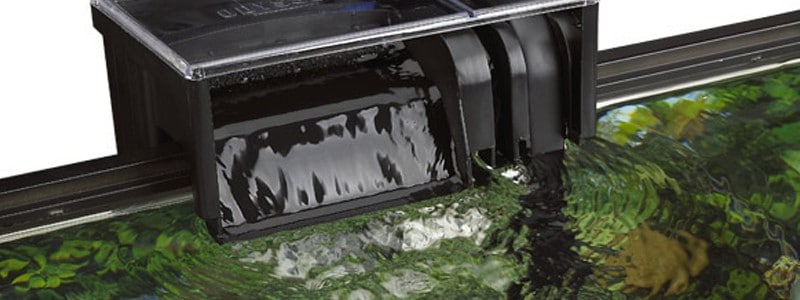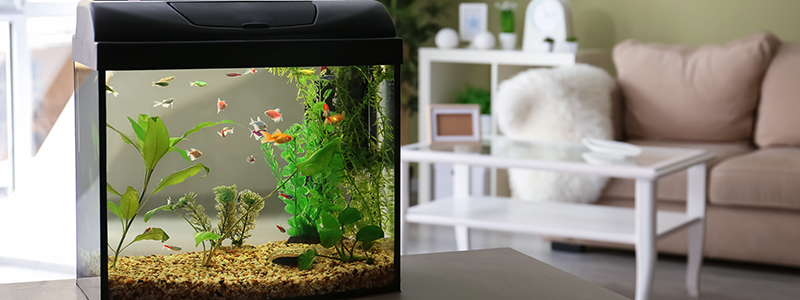Fish hobbyists of all skill levels and experience are all too familiar with the importance of good filtration. Choosing the right filter is probably the most important aspect of establishing a fish tank. Not only do filters cycle water through the tank to remove toxins and debris, but they also act as a safe place for beneficial bacterial colonies to establish. We’ve previously discussed the benefits of running multiple filters in a large aquarium, which can be a great way to increase filtration and water flow in larger tanks. However, this leads us to another important question: can an aquarium be over-filtered?
It’s almost impossible for an aquarium to be over-filtered. Most filtration systems use a combination of mechanical and biological filtration to remove debris and certain chemicals from your aquarium water. There’s no limit to how clean you can make the water through these methods. A tank with several filters processing the water won’t disrupt the water quality in any harmful way.
Keep in mind that this does not mean that you no longer need to perform routine water changes! The bacterial colonies that establish in a filter break down the nitrites from fish waste into a less harmful chemical called nitrate. Although this is less harmful than the waste, it can build up to dangerous levels over time. Your extra filters don’t get rid of nitrates, so you will need to keep up with the water changes.
Overview of Aquarium Filtration
Under-filtering your tank is much more dangerous to the health of your tank than over-filtering- and overstocking your tank is worst of all! This is due to the balance of chemicals- the nitrogen cycle- mentioned above. The size of your tank, the number of stocked fish, and the efficiency rating of your filter can all affect this in different ways. To make things simple for yourself, always choose a filter (or combine multiple filters) that are rated for the exact gallons of your tank or higher- and never overstock. If you purchase a filtration system that is rated for a larger aquarium, that’s great- should you ever upgrade your tank, you will be good to use the same filter. What’s not great is trying to justify a few extra fish in your maxed-out tank because your filter is overpowered. The bioload will be too high for the volume of water, no matter how strong the filters are.
How Many Filters Can I Have?
While there is no such thing as too much filtration, you will want to consider the comfort of your fish and your own visual preferences when deciding how many filters you want to have. While you probably don’t want to cram your aquarium full of canisters, using multiple filtration systems has many benefits. It can give you added security in case one of your filters breaks or needs replacing. Having a backup filter already established and running will save your tank from going unfiltered while you find a replacement. Having multiple filters can also be a great way to disperse some of the benefits of your filter placement throughout the tank. If you have a large tank, spreading out multiple filters across the space can be great for spreading out the water flow and aeration to other parts of the tank.
While there are no upper limits to the filtration you can provide to your aquarium, there are likely some physical limitations on how many filters you can reasonably accommodate. The size of your tank and the requirements of your fish will dictate how many filters you can have. The larger your tank, the more space you will have available for your filters and fish to thrive together.
Filtration Types and Combinations

You also might be interested in multiple filters when you have a wider range of filtration needs where a combination of different models would make sense. There are several types of filters on the market, with the most common being canister filters, hang on back filters, sponge filters and under gravel filters to name a few. All of these filter types are very different and offer different levels of filtration. For example, under gravel filters are considered to be ineffective on their own by many aquarists. However, when combined with another filter, such as a canister or hang on back filter, it can provide a greater flow and create a more healthy ecosystem for your fish.
Having several types of the same filter can also be a great solution. For example, If your tank is very large and wide, having multiple power filters can increase the water movement so that you don’t have corners going stagnant. If you have a tank with fish that are sensitive to a high water flow, such as fry, using multiple sponge filters can be a great way to increase the filtration without introducing any dangerous currents.
When to Limit Filtration
There are seldom any occasions where less filtration is better. In fact, it’s always better to over filter than not filter it at all. However, there are some situations where increased water flow can be problematic- and more filters do lead to increased water flow. There are some fish that struggle in strong currents, and would have a hard time swimming in a tank that had multiple strong filters. Shallow water fish- such as Bettas- are used to very still water and low current. They can be easily pushed around by strong filters, and can have difficulty swimming against the flow. This can lead to an exhausted and stressed fish- and open up the door to disease.
Smaller varieties of fish, like guppies or fry, can also have issues with strong filters. With smaller fish, there is an increased danger of them being sucked into the filter- leading to injury or worse. Of course, no fish should be without filtration, so in these instances it’s best to supply a gentle sponge filter. No products found. will still provide adequate filtration, but eliminate the possibility of injury due to the outer sponge layer.
When it comes to aquarium plants, you should also take some time to consider the water flow. In saltwater reef tanks, a high flow is often necessary for live corals to grow because they evolved to thrive in the ocean waves. In these situations, a high flow filter (or multiple filters) can be an asset. However, for freshwater planted aquariums, there are some plants that have shallow root systems and can easily become uprooted if the water flow is too strong. You will have to take your plant goals into consideration when deciding the type of filtration system that will best suit your needs.
Dangers of Aquarium Filters
In addition to making sure that your filter type is a good fit for your fish, you should also make sure that you have taken some precautions to ensure that your filters are safe for your fish. With any piece of equipment or foreign object that you’re placing in your tank, you need to ensure that it can’t harm your fish in any way. Items with sharp edges, pointed corners or strong currents can be potential hazards to susceptible fish and invertebrates.
When it comes to making sure a filter is safe for your fish, it might be best to steer clear of filters that are too strong for your tank. Fish whose features are more delicate, such as fish with trailing fins or slow swimmers, can be injured if they stray too close to an overpowered filter. If they aren’t strong enough to pull away from the current, they can get sucked into the filter intake- which can cause serious damage.
Conclusion: Can an Aquarium be Over-Filtered?
It’s pretty much impossible to over filter your tank. In fact, there are multiple benefits to be had from using multiple filters if you have a large tank. Using more than one filter can make repairs and cleaning easier on you and keep the natural balance of your water quality in check. You can also scale up the power of your filters if you would like, as long as you are careful not to overstock your tank to compensate for the extra filtration.
The number of fish you can sustain in your tank is decided by the volumes of your aquarium, not the power rating of your filtration system. There are many types of filters on the market, and you can even try different combinations of filters to find a setup that works for you.Although there is nothing wrong with over filtering your tank, you should take care to make sure you aren’t disturbing your fish with increased water flow.
There are some species of fish that can’t handle a strong current, and will not do well in a tank with multiple strong filters. While choosing a filter that is rated for a larger tank can have it’s benefits, it’s also important to remember that an overpowered filter might not always be the best fit for every fish. Small fish and slow swimmers can be easily sucked into the intake of a strong filter, which can lead to damage.
Related Topics
If you like the article above, here are some other similar articles you should check out!
How often can I add Fish to my Aquarium?




